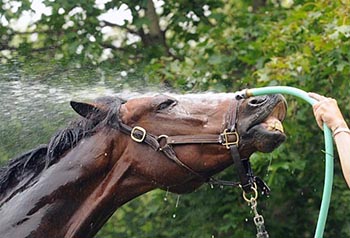
Horses Hate Heat – Watch For Heat Stroke
 It’s show season. It’s trail-riding season. It’s summer time – filled with high humidity, temperatures and heat indexes. As you prepare yourself for fun in the sun with your favorite equine, make sure to take proper precautions with your horse.
It’s show season. It’s trail-riding season. It’s summer time – filled with high humidity, temperatures and heat indexes. As you prepare yourself for fun in the sun with your favorite equine, make sure to take proper precautions with your horse.
Did you know that just 17 minutes of moderate exercise in hot weather can raise a horse’s internal temperature to dangerous levels? They heat up 3-10 times faster than humans. When you think you feel hot and sticky, try to imagine your horse.
Why do horses heat up so much faster than humans? There are several reasons. First, they have a greater percentage of active muscles which, when used, produce a great deal of heat. Horses also can sweat up to 8 gallons per hour trying to stay cool. Unfortunately, only 25-30% of this evaporating sweat actually helps cool the horse – the rest drips onto the ground or soaks the saddle pad. And horse sweat contains salt, a lot of it.
Typical equines drink one gallon of water for each 100 pounds of body weight. Water is vital to the regulation of body temperature as well as transporting nutrients and facilitating waste removal. Even an outside temperature increase from the high 50s to low 70s can cause a horse in drink up to 20% more water. With the loss of so much salt through the sweating process you might need to place an electrolyte solution in the water for your horse to drink. Not every horse requires this, so make sure you work closely with your veterinarian to see if yours does.
Help your horse stay cool by keeping him in shade and keep the air moving. Cover pink noses with zinc oxide to prevent sunburn. Try various fly control methods to see what works best for you so the horse doesn’t continually stomp his feet fighting off the flies. If your horse is stalled during the day, keep it clean. Bedding that is soaked with urine and manure can quickly ferment, a process which generates both heat and ammonia, and can possibly increase the risk for lung disease. Hang a fan in a safe location to blow into the horse stall. Make sure your horse has sufficient nourishment as horses require energy to stay cool and warm. If your horse gets too warm, drape a towel dipped in a bucket filled with ice water, on his neck.
Heat stroke can strike at any time, whether the horse is standing in a stuffy stall, being hauled in a trailer, or working hard.
Immediately call your veterinarian if any of these symptoms display in an inactive horse:
- Increased respiration. The normal range is from 4 -16 breaths per minute.
- Increased pulse. If his heartbeat doesn’t drop after several minutes or continues climb after exercise has stopped.
- Profuse sweating or No sweating. If the horse suddenly stops sweating, his coat quickly dries, and then his hair stands on end, a severe breakdown of his body’s cooling mechanism is occurring. IMMEDIATELY begin cooling his body by spraying the large blood vessels in his neck, inner legs and belly.
- Body temperature greater than 103◦. Heat exhaustion may cause the body temperature to rise to between 105◦ – 108◦. During heat stroke, the temperature may rise up to 115◦ and the horses’ eyes may have a vacant staring expression. Again, IMMEDIATELY begin cooling his body by spraying the large blood vessels in his neck, inner legs and belly.
- Irregular heartbeats.
- Dehydration. As with humans, pick a pinch of skin along your horse’s neck. If it stays pinched, the horse if dehydrated. If it quickly snaps back then your horse is hydrated.
 While you wait for your vet, use shade, breezes and fans as much as possible. A horse can cool down two degrees in 10 minutes if you continually pour on cold water and immediately scrape it off, repeating this process until his body temperature lowers. DO NOT let the water stay on the horse as this will only trap the heat. Keep the hose in one hand and the scraper in the other as you concentrate on his neck, inner legs and belly.
While you wait for your vet, use shade, breezes and fans as much as possible. A horse can cool down two degrees in 10 minutes if you continually pour on cold water and immediately scrape it off, repeating this process until his body temperature lowers. DO NOT let the water stay on the horse as this will only trap the heat. Keep the hose in one hand and the scraper in the other as you concentrate on his neck, inner legs and belly.
While the summer gets hotter and hotter, we can keep our horses cooler by riding in the mornings or early evenings. Know your horse’s habits and behaviors and watch for any changes in them.
Take proper precautions for yourself and your horse and have a safe and happy summer.



 We are licensed in all states but Alaska!
We are licensed in all states but Alaska!